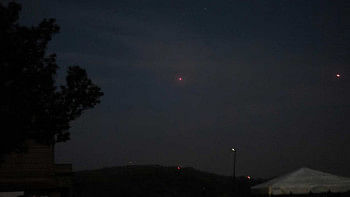UN inspectors come under sniper attack
 United Nations vehicles transport a team of UN chemical weapons experts to the scene of a poison gas attack outside the Syrian capital last week, in Damascus yesterday. The experts dressed in blue UN body armour, left in a six-car convoy, according to a Reuters witness, and were accompanied by security forces and an ambulance. Photo: REUTERS
United Nations vehicles transport a team of UN chemical weapons experts to the scene of a poison gas attack outside the Syrian capital last week, in Damascus yesterday. The experts dressed in blue UN body armour, left in a six-car convoy, according to a Reuters witness, and were accompanied by security forces and an ambulance. Photo: REUTERS
UN chemical weapons inspectors in Syria met and took samples from victims of an apparent poison gas attack in a rebel-held suburb of Damascus yesterday after the UN team themselves survived a sniper attack that hit a vehicle in their convoy, reported Reuters.
A Syrian doctor told Reuters from the suburb, Mouadamiya, that investigators from the United Nations had crossed the frontline from the center of the capital, which remains under the control of President Bashar al-Assad's forces.
The UN said one vehicle in its convoy had been crippled by shooting by "unidentified snipers", but mentioned no injuries. Their arrival meant whoever fired had failed to turn them back.
With Western powers considering military strikes, despite vocal opposition from Assad and his Russian and Iranian allies, any evidence to support rebel claims that government forces fired gas-laden rockets five days ago that killed hundreds of civilians will be a key element in arguments for peace or war.
"I am with the team now," the doctor who uses the name Abu Karam told Reuters by telephone from rebel-held Mouadamiya.
"We are in the Rawda mosque and they are meeting with the wounded. Our medics and the inspectors are talking to the patients and taking samples from the victims now."
Wassim al-Ahmad, an opposition activist, said members of the Free Syrian Army umbrella rebel organisation and the opposition's Mouadamiya Local Council were accompanying the inspectors on their tour of the suburb.
Activists say at least 80 people were killed in Mouadamiya when the district was hit with poison gas at 4:00am on August 21. Three other rebel-held districts - Irbin, Ain Tarma and Jobar - were also hit in attacks that killed hundreds of people.
The inspectors pressed on despite the sniper attack that disabled the lead vehicle in their convoy, forcing them to turn back for a replacement car.
"The first vehicle of the Chemical Weapons Investigation Team was deliberately shot at multiple times by unidentified snipers in the buffer zone area," a UN statement said.
Syrian state television blamed rebel "terrorists" for the shooting. The opposition blamed it on pro-Assad militiamen. Any delay diminishes whatever evidence the experts might recover.
Meanwhile, Syrian President Bashar Assad says his troops did not use chemical weapons in an attack on rebel-held suburb in a Damascus suburb last week where hundreds of people died, AFP reported.
Assad told Russia's Izvestia daily that the accusations that his troops were responsible were "politically motivated." He said in an interview published yesterday that attacking such an area with chemical weapons would not make sense for the government as there was no clear frontline between regime and rebel forces.
Syria said Sunday that a UN team could investigate the site but a senior White House official dismissed the deal as "too late to be credible."
Bashar al-Assad warned the US of "failure" if it attacks Syria.
Assad argued Washington's recent military campaigns had all fallen short of their aims.
"The United States faces failure just like in all the previous wars they waged, starting with Vietnam and up to our days," he said.
A US diplomatic offensive led by Secretary of State John Kerry, comments coming from the White House and signs the Pentagon is positioning ships closer to Syria fuelled an impression that President Barack Obama may be getting ready to jettison his antipathy to new Middle Eastern entanglements and to order limited military action.
Kerry has spent days on the phone with Washington's foreign partners.
French President Francois Hollande told his US counterpart that "everything was consistent" with the conclusion that Damascus was behind the attack.
Russian Foreign Minister Sergei Lavrov warned Kerry of the "extremely dangerous consequences" of launching military action.

 For all latest news, follow The Daily Star's Google News channel.
For all latest news, follow The Daily Star's Google News channel. 



Comments